Exploring Vegan Passover: A Comprehensive Guide
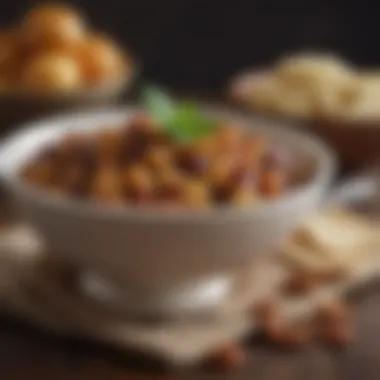
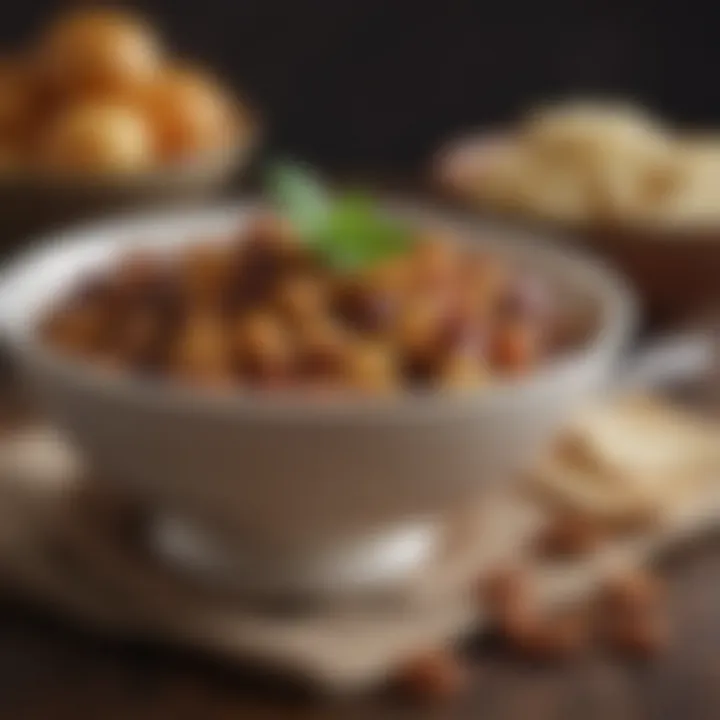
Intro
Celebrating Passover offers a unique opportunity to reflect on traditions while exploring a vegan lifestyle. For those who embrace veganism, integrating this dietary practice into the ancient customs of Passover may seem challenging. However, it is not impossible. By understanding the underlying principles of both Passover and veganism, individuals can find new ways to appreciate the holiday. This guide aims to bridge this gap, drawing connections between a plant-based diet and the significance of the holiday.
Foreword to Vegan Passover
The concept of Vegan Passover is increasingly relevant in today's world, where dietary choices often reflect personal values. This section serves to underscore the significance of merging vegan principles with the cherished traditions of Passover. As individuals and families seek to celebrate this holiday, understanding how to incorporate veganism into their observance can lead to deeply meaningful experiences.
Definition of Veganism in the Context of Passover
Veganism, defined as a lifestyle that abstains from the use of animal products, holds unique implications during Passover. This holiday, which commemorates the liberation of the Israelites from Egypt, involves several symbolic foods that traditionally contain animal products, such as charoset made with honey or dishes utilizing eggs. Thus, to adapt for a vegan diet involves careful consideration of substitutions that preserve the essence of the holiday while honoring ethical eating practices.
The goal is to align one's dietary choices with the principles of compassion and sustainability, reflecting the broader themes of freedom and renewal inherent in Passover. Importantly, a vegan approach does not eliminate the spiritual richness of the holiday; it instead reinvents it in a way that remains respectful and inclusive.
Overview of Passover Traditions
Passover is rich with traditions that have been passed down through generations. The Seder meal, which occurs on the first two nights of the holiday, is central to the observance. This meal features four cups of wine, matzah, and various symbolic foods on the Seder plate, each item representing aspects of the Israelites' plight in Egypt.
Key elements of Passover include:
- Matzah: Unleavened bread that symbolizes the haste in which the Israelites fled Egypt.
- Four Cups of Wine: Each cup represents a promise of redemption made by God to the Israelites.
- Maror: Bitter herbs, such as horseradish, that remind participants of the bitterness of slavery.
- Charoset: A sweet mix of fruits and nuts, symbolizing the mortar used by the Israelites during their enslavement.
In a vegan context, adaptations of these foods are essential to maintaining traditions while aligning with a plant-based lifestyle. By understanding the cultural significance of these foods, individuals can creatively reinterpret them using vegan ingredients that resonate with the same symbolic meanings.”
"Tradition is not the worship of ashes, but the preservation of fire."
This guide aims to illuminate the path for those wishing to celebrate Passover in a way that honors both their dietary choices and the rich traditions of the Jewish faith.
Historical Context of Passover
Understanding the historical context of Passover is crucial for a meaningful celebration, especially for those adopting a vegan lifestyle. This festival signifies a rich tapestry of faith, culture, and tradition that dates back thousands of years. For vegans celebrating Passover, it is essential to recognize the layers of meaning behind the rituals, which often inform their choices around food and practice.
Origins and Significance
Passover, or Pesach, originates from the Hebrew Bible, particularly the book of Exodus. It commemorates the liberation of the Israelites from Egyptian slavery. This moment is pivotal not just for Jewish identity but also illustrates themes of freedom, resilience, and divine intervention. Historically, the festival has been observed for over three millennia, evolving through various cultural lenses but always maintaining its core essence.
The significance of Passover is evident in the rituals that accompany it. The Seder meal, full of symbolic foods and readings, serves to remind participants of their shared history. For those following a vegan lifestyle, it becomes a moment to reflect on ethical treatment of animals and environmental stewardship, considering how these align with the broader values of compassion found in many interpretations of Jewish thought.
"Passover invites reflection on personal and collective freedom, urging celebration while respecting the past."
This historical backdrop encourages individuals to engage deeply with the narrative of Passover. It fosters a connection between ancient struggles for liberation and contemporary ethical living.
What Passover Commemorates
Passover commemorates not just the Exodus but a journey towards self-awareness and ethical responsibility. The key event celebrated is the liberation of the Israelites, symbolized through the story of the ten plagues that befell Egypt. The last plague, which involved the death of the firstborn, prompted the Israelites to mark their doors with lamb's blood so that the angel of death would pass over their homes. This act of safeguarding life is central to the observance of Passover, highlighting the importance of protection and survival.
For vegans, the act of remembrance can take on an additional layer. Instead of using traditional animal-based products, it prompts a reconsideration of how food choices can reflect ethical values. The challenge lies in maintaining the essence of tradition while embracing a compassionate lifestyle. This historical mention allows for the incorporation of vegan substitutes for the seder plate offering a respectful nod to the history while avoiding animal-derived ingredients.
The Vegan Perspective
Understanding the vegan perspective within the context of Passover is significant for those aiming to merge dietary choices with traditional practices. This section elaborates on ethical and nutritional aspects, which are integral parts of the vegan lifestyle. The focus on these elements enriches the celebration and underscores the deep connections between food, culture, and moral considerations.
Ethical Considerations
One primary tenet of veganism is its emphasis on ethical eating. For many, this involves a commitment to animal welfare. By choosing a vegan approach during Passover, individuals align their dietary habits with their ethical values. This choice often reflects a desire to reduce harm to animals and promote a more compassionate lifestyle. In a religious context, this can also mean honoring the sanctity of life, which resonates deeply during Passover.
The issue goes beyond just animals; it extends to environmental sustainability. The production of plant-based foods typically requires fewer resources and generates less pollution than animal agriculture. This aspect aligns well with many Passover themes of freedom and responsibility to the earth. The vegan perspective thus emphasizes the impact of our dietary choices, encouraging a reflection on what sustains us and how we contribute to the world around us.
Nutritional Benefits of Veganism
Adopting a vegan diet during Passover can lead to numerous nutritional benefits. Many plant-based foods are rich in essential vitamins, minerals, and fiber, which can improve overall health. For instance, legumes, nuts, and whole grains provide protein and vital nutrients without the saturated fats commonly found in animal products.
Moreover, a vegan diet can promote heart health. Studies have shown that plant-based eating can lower cholesterol and blood pressure levels, significantly reducing the risk of heart disease. During Passover, focusing on fruits and vegetables allows for a colorful and diverse plate that aids digestion and enhances nutrient intake.
When planning meals for a vegan Passover, it is wise to include a variety of food groups to meet dietary needs. Here are some essential nutritional considerations:
- High-fiber options such as beans, lentils, and whole grains help regulate appetite and improve gut health.
- Rich sources of vitamins found in leafy greens and berries support overall wellness and immunity.
- Healthy fats from avocados, nuts, and seeds contribute to brain health and energy.
Through a balanced and thoughtful approach, the vegan perspective on nutrition supports a joyful and nourishing Passover celebration.
Challenges of a Vegan Passover
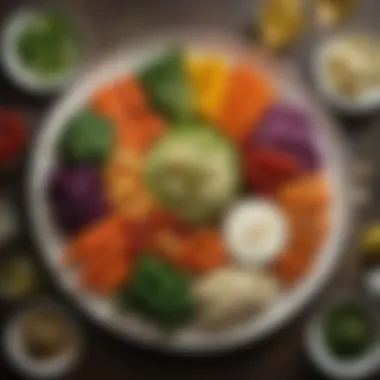
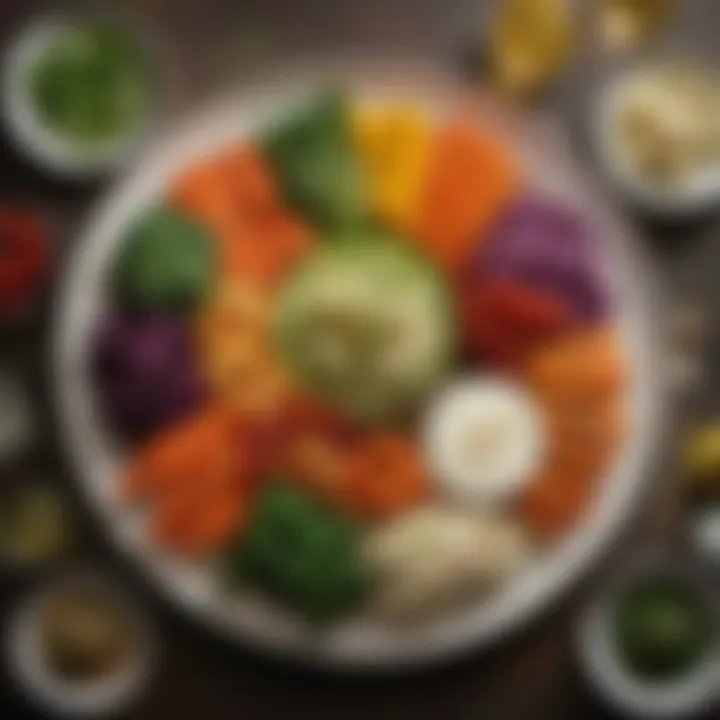
Celebrating Passover while adhering to vegan guidelines presents unique challenges. It is essential to understand these challenges to create a meaningful and respectful experience. Navigating the complexities of traditional practices can result in deeper reflections on values and cultural identity. By acknowledging these challenges, one can approach vegan Passover with creativity and mindfulness.
Ingredient Restrictions
Passover has strict kosher rules, particularly concerning leavened bread. This presents the first obstacle for those following a vegan diet. Traditional matzo is generally vegan, but it must not contain any non-kosher ingredients. Some common items used in cooking for Passover, like broths and processed sauces, may have animal products.
Ingredients to avoid include the following:
- Chametz: This term refers to any leavened grain products, which are strictly prohibited. Hence, all traditional bread, pasta, and baked goods are out.
- Non-vegan broths: Many pre-made broths may come from animal sources, so it is vital to check labels.
- Creams and oils: Some recipes may call for dairy products or animal fats, which need to be replaced with plant-based alternatives.
The restrictions can lead to limited options, yet many substitutes exist. Using whole foods like vegetables, legumes, grains, and nuts allow a plethora of nutrients while maintaining Passover requirements.
Maintaining Tradition While Adapting Recipes
To embrace veganism fully during Passover, it is vital to adapt traditional recipes while staying true to their essence. Many dishes have symbolic meanings that contribute to the richness of the holiday. When modifying these recipes, consider both flavor and significance.
Here are tips for adaptation:
- Embrace plant-based alternatives: For instance, use aquafaba as a substitute for egg in matzo balls or chickpea flour for a similar texture.
- Flavor profiles: Use herbs and spices to create depth in dishes. Ingredients like smoked paprika, garlic, and nutritional yeast can add umami without animal products.
- Retain symbolism: It can be helpful to consider the significance behind each dish. For example, a traditional charoset can be made with nuts and dried fruits instead of honey.
"Adapting recipes allows individuals to honor cultural traditions while embracing modern dietary principles, creating a richer experience."
Planning a vegan Passover is not merely about replacing ingredients but also about creating a joyful and reflective celebration. It requires thoughtfulness to understand what each food symbolizes and how to keep that meaning alive in the face of dietary changes. Understanding ingredient limitations grants one the opportunity to innovate creatively and maintain lineage. By reinterpreting old recipes, one can build new traditions that enhance the experience of Passover.
Essential Ingredients for Vegan Passover
Celebrating Passover with a vegan diet requires careful selection of ingredients that can both respect tradition and cater to vegan principles. This section explores the essential ingredients that ensure any meal is not only fitting for Passover but also nourishing and flavorful. The careful balance of these components is crucial because they must align with the dietary restrictions during this significant Jewish holiday, while also supporting a commitment to veganism.
Key Vegan Staples
For a successful vegan Passover, there are several key staples that form the foundation of meals.
- Matzo Meal: This finely ground flour made from unleavened bread is essential. It can serve as a base for various dishes, including matzo balls or as a thickening agent for soups.
- Nut Butter: Almond, peanut, or tahini can enrich snacks and meals, providing both protein and healthy fats, making them filling.
- Legumes: Beans, lentils, and chickpeas are valuable protein sources. They can be used in salads, soups, or stews, adding depth and nourishment.
- Fruits and Vegetables: Fresh produce is important for a balanced diet. Seasonal vegetables and fruits can provide natural sweetness and vibrant flavors. Carrots, beets, and greens are often found in traditional dishes.
- Herbs and Spices: Fresh herbs like parsley and cilantro, along with spices like cumin and paprika, add layers of flavor to dishes. They can elevate simple salads or cooked vegetables to a new level.
Substitutes for Traditional Passover Foods
Many traditional Passover foods can be adapted to be vegan without losing their essence. Here are some effective substitutes:
- Eggs: Silken tofu can be used in recipes where eggs are traditionally needed. When pureed, it has a consistency similar to eggs and works well in baked goods.
- Margarine: Instead of butter, vegan margarine can be used. Look for brands that are kosher for Passover.
- Honey: Maple syrup is an excellent vegan alternative to honey. It adds sweetness while maintaining a plant-based approach.
- Dairy: Almond milk or coconut yogurt can replace dairy products in recipes, providing creaminess without animal products.
- Meat: Tofu or tempeh can serve as substitutes in main dishes, offering protein and saturating texture similar to traditional meats. Additionally, seitan, which is made from wheat gluten, can mimic meat in various preparations.
By choosing specific staples and viable substitutes, one can successfully navigate the culinary challenges of a vegan Passover, ensuring both tradition and dietary preferences are honored during this important celebration.
Vegan Passover Recipes
Vegan Passover recipes play a crucial role in merging tradition with modern eating habits. As many families come together to celebrate this significant holiday, the importance of vegan recipes cannot be overstated. These recipes allow individuals to maintain the essence of Passover while avoiding animal products. This not only aligns with ethical beliefs but also caters to health-conscious trends.
Offering diverse and delicious vegan options enriches the Seder plate. It brings a sense of inclusivity to the table, catering to those who follow a strict vegan lifestyle. Realizing the need for accessible and flavorful meals means that guests can fully engage in the celebration without feeling left out. Additionally, preparing vegan dishes can be a fun and creative process, allowing culinary experimentation.
Appetizers
Starting the meal with well-thought appetizers sets a positive tone for the evening. Vegan appetizers can be made using a variety of ingredients that adhere to both Passover rules and vegan principles.
- Stuffed Mushrooms: These are simple yet elegant. Fill large button mushrooms with a mix of breadcrumbs, garlic, herbs, and a bit of nutritional yeast for cheesiness.
- Sweet Potato Latkes: A twist on traditional potato latkes, these can be made with sweet potatoes and sweet spices. They are crispy and rewarding.
- Hummus and Veggies: A classic that never goes out of style. Utilizing tahini, chickpeas, and tahini or lemon juice creates a flavorful dip. Serve it with a variety of fresh vegetables.
By choosing to start with appetizers like these, you provide a flavorful entrance to the meal that builds anticipation for the main courses.
Main Courses
Main courses set the centerpiece of the Passover meal. It is important to offer something hearty that captures everyone’s attention. Vegan options can be just as satisfying as traditional ones.
- Mushroom and Lentil Shepherd's Pie: Using lentils as a base creates a protein-rich dish. Top it with mashed potatoes made creamy with almond milk.
- Stuffed Peppers: These peppers can be filled with quinoa, black beans, diced tomatoes, and spices. They are colorful and appealing on the plate.
- Vegan Coq au Vin: For a twist, utilize plant-based protein sources simmered in a red wine sauce with vegetables.
Having a variety of main courses means that guests can find something that appeals to their taste preferences while maintaining adherence to vegan dietary choices.
Desserts
Desserts can be the highlight of any meal. They provide sweetness and satisfaction, concluding the meal on a high note. In a vegan context, options are numerous and exciting.
- Vegan Chocolate Cake: A rich dessert that uses alternatives like apple sauce and plant-based milk to create moistness without eggs.
- Coconut Macaroons: These delightful treats can be made by simply mixing shredded coconut with agave syrup and baking until golden.
- Fruit Compote with Coconut Whipped Cream: This light option utilizes seasonal fruits, simmered and paired with a dairy-free whipped cream.
Offering a well-rounded dessert menu allows indulgence without compromising on ethical considerations.
Vegan Passover recipes reflect the merging of tradition with contemporary dietary practices. Through careful meal planning, celebration can be both meaningful and inclusive.
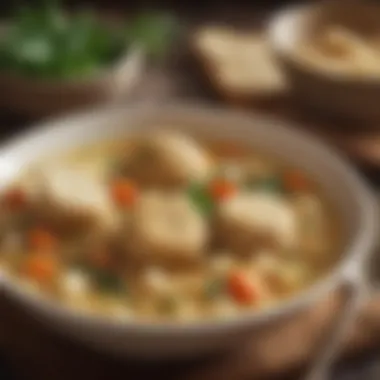
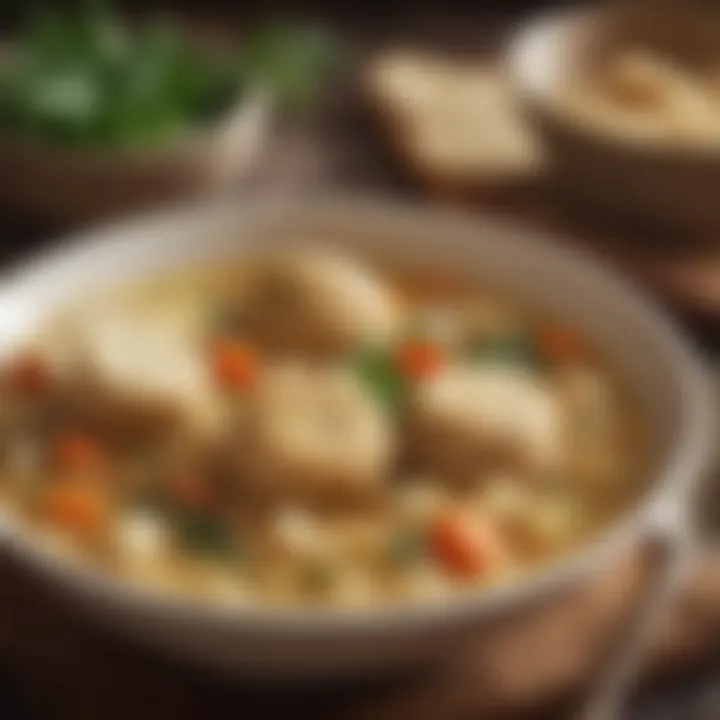
Symbolic Foods for Vegan Passover
Symbolic foods hold significant meaning during Passover, especially in the context of the Seder meal. These items represent various historic narratives and religious themes central to the Passover story. For a vegan Passover, understanding these symbolic foods is crucial, as it helps maintain the spirit and teaching of the tradition while respecting the ethical standards of veganism.
Importance of Symbolic Foods in the Seders
During the Seder, certain foods are placed on the Seder plate, each with deep historical and religious significance. For example, maror (bitter herbs) symbolizes the bitterness of slavery, while charoset (a sweet paste of apples and nuts) represents the mortar used by the Hebrew slaves. These items not only connect attendees to their heritage but also serve as conversation starters about freedom, struggle, and hope. The act of eating these foods during the Seder encourages reflection and discussion about the importance of liberation not just in the past but in contemporary contexts as well.
As veganism often emphasizes compassion for all living beings, incorporating symbolic foods that align with these values can create a meaningful celebration. Understanding the origins and meanings behind these foods enables individuals to participate in these traditions thoughtfully, ensuring inclusivity while honoring dietary choices.
Vegan Versions of Symbolic Foods
Finding appropriate vegan substitutes for traditional symbolic foods is essential for a vegan Passover. Below are several common symbolic foods and their vegan alternatives:
- Maror (Bitter Herbs): Traditional maror can be made from horseradish. For a vegan twist, consider using fresh dandelion greens or endives, which offer the necessary bitterness.
- Charoset: While traditional charoset often contains nuts and wine, vegans can enhance flavor using a mix of apples, cinnamon, and a splash of grape juice for sweetness. Other variations include using dates and apricots for a different texture.
- Karpas (Vegetable): Typically, karpas is a green vegetable like parsley intended for dipping in salt water. This can remain vegan, as it generally does not contain animal products.
- Z'roa (Shank Bone): Traditionally, a lamb bone symbolizes the paschal sacrifice. In a vegan setting, some replace it with a roasted beet, which can remind participants of the original symbolism without using animal products.
- Chazeret (Second Bitter Herb): Swiss chard or collard greens can serve as excellent replacements, emphasizing the bitterness associated with slavery and struggle.
By using these alternatives, participants can engage authentically in the Seder while adhering to vegan principles. The celebration can therefore remain vibrant and rooted in tradition, reflecting both respect for historical narratives and contemporary values of compassion.
Planning a Vegan Passover Seder
Planning a Vegan Passover Seder is essential for anyone looking to merge traditional Jewish customs with a vegan lifestyle. This task requires careful thought and consideration regarding ingredients, recipes, and overall settings of the Seder. By planning effectively, one ensures that the spirit of Passover is honored while adhering to vegan principles. The focus on plant-based options allows participants to engage with the celebrations meaningfully and ethically.
The importance of a well-structured Seder plate cannot be overstated. It is a central element of the Passover experience. Each item on the plate holds symbolic significance. Therefore, when creating a vegan Seder plate, it is vital to understand traditional symbols and find plant-based alternatives that fit these roles. This process contributes to maintaining an authentic experience while supporting one's dietary choices.
Creating a Vegan Seder Plate
A Vegan Seder plate includes traditional symbolic foods made entirely from plant sources. Common ingredients such as horseradish root, parsley, and charoset can easily be made vegan.
- Maror: This bitter herb can remain horseradish, as it is inherently vegan.
- Charoset: This sweet and nutty paste can be prepared using apples, almonds, cinnamon, and some sweet wine.
- Karpas: This requires a vegetable such as fresh dill or parsley, served for dipping in salt water.
- Zeroa: Although traditionally a shank bone, a vegan substitute can be a roasted beet or a whole artichoke, which symbolize strength and resilience.
- Beitzah: This may be a roasted potato or eggplant, signifying fertility and rebirth.
By thoughtfully selecting these items, the Vegan Seder plate retains its importance while presenting a compassionate philosophy.
Conducting the Seder with Vegan Principles
When conducting the Seder, it is vital to incorporate vegan principles into each aspect. This includes the readings, songs, and discussions that traditionally accompany the Seder meal. Engaging guests in conversations about the ethical implications of veganism can help deepen the experience. Here are some strategies to ensure a thoughtful approach:
- Readings: Choose texts and passages that highlight themes of freedom, liberation, and compassion.
- Discussion Points: Incorporate discussions about healthy eating, sustainability, and animal welfare in relation to food choices.
- Songs and Prayers: Adapt traditional songs to include messages about kindness toward all living beings.
"The Seder is an opportunity for reflection and meaning, which aligns with vegan values of empathy and ethical living."
In sum, planning a Vegan Passover Seder involves balancing tradition with ethical considerations. By creating a meaningful Seder plate and conducting the Seder in a way that emphasizes vegan principles, participants can celebrate the holiday in a way that reflects their values.
Vegan Wine for Passover
The inclusion of vegan wine in Passover celebrations can be viewed as both a necessity and an opportunity. Wine holds a central role in Jewish rituals, symbolizing joy and communal unity. As such, selecting a wine that aligns with vegan values becomes essential for those observing Passover while adhering to a plant-based lifestyle. This section discusses vital aspects that should be considered when choosing vegan wine for your Seder, as well as its overall significance in the Passover tradition.
Selecting Vegan Wines
When choosing wine for Passover, it is crucial to understand what makes a wine vegan. Not all wines are created equal; many conventional wines use animal-derived fining agents such as isinglass (fish bladder), gelatin, and casein (milk protein). These elements are not visible in the finished product, making it challenging for consumers to identify non-vegan wines. Therefore, opt for wines labeled as "vegan" or "no animal-derived ingredients" to ensure that your selection aligns with vegan principles.
Some noteworthy tips include:
- Research Brands: Look for breweries and wineries known for their vegan products. They often provide details on their processing methods, allowing you to make informed decisions.
- Check Certification: Certifications from vegan organizations can help identify wines that are free from animal products.
- Contact Producers: If uncertain, reaching out to wineries can clarify whether a specific wine is vegan-friendly.
This thorough selection process will ensure that not only are you respecting the ethics behind veganism, but also your wine choice enhances the Seder experience.
The Role of Wine in Passover Celebrations
Wine plays a multifaceted role during Passover celebrations. Traditionally, four cups of wine are consumed at the Seder, each having its own significance. These cups correspond to the four expressions of redemption found in the Torah. The ritualistic consumption of wine highlights key themes such as freedom, gratitude, and unity among participants. Furthermore, wine is often used to elevate the mood of the gathering, making the experience more festive and communal.
Additionally, the act of drinking wine is intertwined with blessing rituals, enriching the overall spiritual atmosphere. This emphasizes why vegan wine, specifically, remains relevant in these traditions. Careful selection allows individuals and families to partake in joyous moments of Passover without compromising their dietary choices or ethical standards.
"The essence of the Seder is not merely the food or the wine, but the connection to the past and the shared experiences of today. Vegan wine is part of that ongoing narrative."
Catering to Various Dietary Needs
Catering to various dietary needs is vital in ensuring that everyone can partake in the Passover celebrations. As families gather around the Seder table, the presence of diverse dietary requirements becomes increasingly common. This section examines the significance of adapting menu options to meet specific dietary restrictions during this important holiday.
By considering gluten-free and nut-free choices, hosts can accommodate guests without compromising the essence of the meal. Ensuring that traditional Passover foods can be enjoyed by all fosters an inclusive atmosphere, allowing everyone to share in the holiday's celebration. Additionally, it reflects a respectful approach toward the health and dietary choices of family and friends.
Gluten-Free Vegan Options
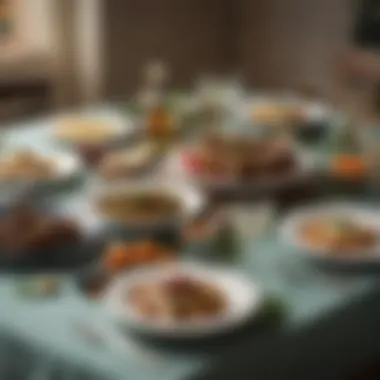
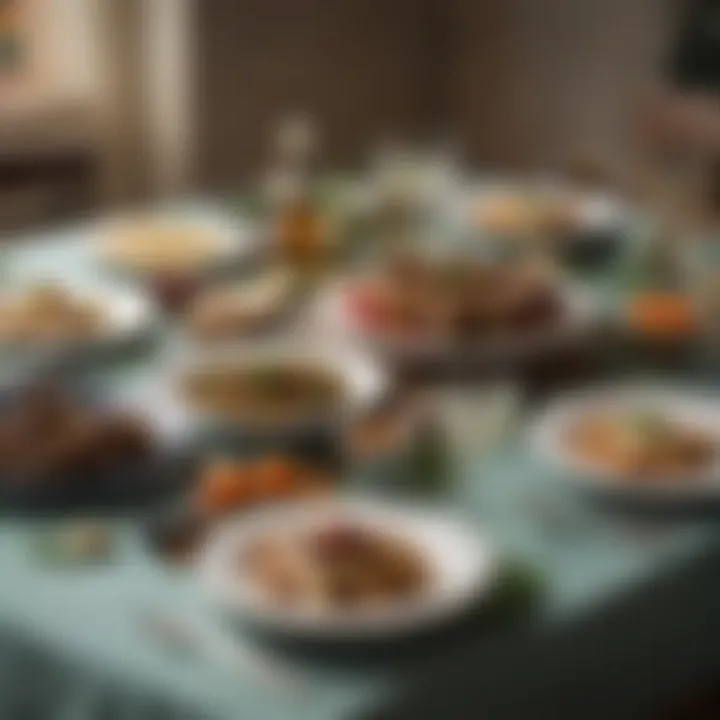
For many, gluten poses a challenge during Passover. Traditional matzah is made from wheat, which eliminates the possibility for those who are gluten-sensitive or have celiac disease. Creating alternative gluten-free options can be an enjoyable task.
- Gluten-Free Matzah: Available in stores, these matzahs are suitable for vegan diets. Ensure that the packaging clearly states it is gluten-free.
- Vegetable-Based Dishes: Use a variety of vegetables like potatoes, carrots, and squash in your recipes to add texture and flavor while keeping them gluten-free.
- Legumes as Dishes: Utilize legumes like lentils and chickpeas. These not only enhance the nutrition but also add a filling component to your meals.
These adaptations do not detract from the spirit of the Seder. Instead, they relay the message of inclusivity that is central to Passover.
Nut-Free Choices for Passover
Nut allergies are another serious consideration during the Passover season. The risk of allergic reactions often necessitates careful planning. To ensure that every guest can enjoy the food, consider the following points:
- Prepare Nut-Free Recipes: Use alternatives to nuts in your recipes. For instance, instead of nut-based desserts, opt for fruit sorbets or coconut-based treats.
- Label Food Clearly: Clearly labeling food choices helps keep everyone informed. This promotes safety and allows individuals with allergies to navigate their food options easily.
- Communicate with Guests: Prior to the celebration, ask guests about their dietary restrictions. By simply checking in with them can help assure a safe and enjoyable dining experience.
These actions not only show consideration but also enhance the enjoyment of the holiday for those with allergies. The adjustments made showcase the importance of inclusivity and thoughtfulness in meal preparations during this significant time.
Vegan Passover Around the World
The topic of Vegan Passover Around the World is essential in this guide because it highlights the diversity and adaptability of vegan practices within Jewish customs. By understanding how various cultures interpret and celebrate this holiday through a vegan lens, we can appreciate the rich tapestry of traditions. This exploration also provides practical insights for those looking to celebrate Passover with compassion, demonstrating that respect for cultural values can blend seamlessly with modern dietary choices.
Global Variations of Vegan Passover Celebrations
Across the globe, Jewish communities incorporate their local ingredients and customs into Passover celebrations. For example, in Israel, many adopt a Mediterranean twist, utilizing vegetables like eggplants and fresh herbs extensively. Dishes like roasted vegetable medleys or tabbouleh made with quinoa instead of wheat are popular. These substitutions not only align with vegan principles, but they also respect the local palate and ingredient availability.
In the United States, there is a growing trend towards plant-based cooking during Passover. Many Jewish families now seek out recipes that highlight seasonal produce, creating dishes such as chickpea brisket or cauliflower kugel. This approach emphasizes the importance of fresh ingredients and their role in nurturing both body and spirit.
Some communities in Eastern Europe maintain traditional flavors by using mushrooms, beets, and cabbage, which are commonly found in local cuisine. Vegan versions of cholent, a hearty stew, are often prepared with beans and barley, showcasing these rich flavors without animal products.
"Embracing veganism during Passover can be a statement of both tradition and modernity."
Incorporating Cultural Influences
Cultural influences play a significant role in how Vegan Passover is celebrated. The exchange of ideas and ingredients can lead to innovative dishes that still pay homage to traditional flavors. In Hispanic Jewish communities, for instance, one might find vegan tamales or chalav that lean heavily on vegetables, bringing a unique flair to the Passover table.
Asian Jewish populations often include elements from their cultural background as well. Dishes like stir-fried vegetables with tofu or spicy vegetable curries can find a place at the Seder, illustrating a beautiful fusion of culinary practices.
Engagement with these various influences can also drive experimentation. Families may find themselves blending different practices to create their own signature vegan Passover meal. This not only enhances creativity in the kitchen but fosters a sense of unity and shared experience among differing cultural backgrounds.
In summary, exploring Vegan Passover Around the World enriches the celebration and offers diverse methods for connecting with both heritage and ethical choices. The adaptability of recipes and customs demonstrates that everyone can honor their roots while embracing a compassionate lifestyle.
Resources for Vegan Passover Celebration
Celebrating Passover with a vegan diet can be a rewarding yet challenging experience. Therefore, having access to the right resources is essential. With the myriad of ingredients, recipes, and traditions involved, guidance can enhance the observance, ensuring it is both meaningful and enjoyable. Different resources can provide invaluable insights into vegan techniques, cultural context, and dietary adaptations that honor the traditional yet embrace the plant-based approach.
Books and Cookbooks
Books and cookbooks specifically focused on vegan Passover can serve as a cornerstone for anyone looking to refine their recipes and techniques. Notable titles often provide a collection of dishes tailored for the holiday, offering traditional flavors with a modern, vegan twist. Here are some benefits of these resources:
- Diverse Recipes: Many of these books feature a wide range of appetizers, main courses, and desserts, showcasing how one can celebrate Passover while adhering to a vegan diet.
- Cultural Context: These resources may also delve into the historical and cultural significance of traditional dishes, enabling a greater understanding of their importance.
- Tips and Tricks: Authors often share personal anecdotes and practical advice, from ingredient sourcing to cooking techniques, which can help both novices and experienced cooks.
- Illustrations: Many cookbooks include beautiful photographs, providing visual inspiration for meal presentation.
Some recommended titles might include works by authors such as Leah Koenig or Judy Zeidler. These writers often exemplify how to maintain the spirit of the holiday through a plant-based diet.
"Vegan recipes for Passover reflect a new understanding of the holiday's symbolic foods, permitting delicious exploration beyond tradition."
Online Communities and Support
In today's digital age, online communities provide vast reservoirs of support and interaction for those navigating a vegan Passover. Forums and groups can connect individuals who share similar dietary commitments or cultural practices. The advantages of joining these platforms include:
- Shared Experiences: Engaging with others facing similar challenges can be comforting. Various users might share their struggles and successes in modifying recipes or sourcing specific ingredients.
- Recipe Exchange: Many community members often share their favorite recipes and cooking tips, thereby broadening the selection of vegan Passover options.
- Culinary Inspiration: Users may post photos and descriptions of their creations, sparking ideas for personal meals.
- Supportive Environment: These communities often foster a sense of belonging, allowing users to ask questions, seek advice, or simply find camaraderie.
Platforms such as Reddit and Facebook host numerous groups dedicated to vegan cooking and Jewish dietary practices. Joining these can be an easy way to tap into a wealth of knowledge and connect with like-minded individuals.
End: Navigating Vegan Passover
In celebrating Passover as a vegan, there is a distinct interplay between tradition and modern dietary practices. The significance of this approach lies in the ability to honor age-old customs while adapting them to a contemporary lifestyle. This balance is vital not only to maintain cultural heritage but also to reflect personal values, particularly those related to ethical and sustainable eating.
In this article, we’ve explored various aspects of vegan Passover, from the historical roots to the symbolic foods that feature prominently during the Seders. Each section illuminated the obstacles one might encounter when integrating vegan principles into this sacred observance. The thoughtful integration of vegan options allows individuals and families to create a meaningful celebration without compromising their dietary choices.
The benefits of navigating this intersection encompass not just nourishment, but also community. Many find that providing vegan alternatives encourages dialogue and broader acceptance within diverse family dynamics. Being innovative in cooking and meal-planning improves one’s culinary skills, making the entire Passover experience more engaging. This can also inspire others around them to consider plant-based diets more seriously.
It is essential to remain respectful of traditions while also recognizing the evolving understanding of health and ethics. The journey of adapting these practices calls for mindfulness, creativity, and courage.
Ultimately, the journey of vegan Passover is about creating a space for connection—whether it is with the traditions of the past, the ingredients of the present, or the diners at the table.
Final Thoughts on Maintaining Tradition While Embracing Change
Maintaining tradition while embracing change is a delicate balance, particularly during Passover. Many may feel apprehensive about altering long-standing recipes that have been passed down through generations. However, this adaptation does not necessarily mean losing the essence of what those dishes represent.
Acknowledge the core values and meanings each food holds. For many, the matzo symbolizes the hasty departure from Egypt, while bitter herbs represent the bitterness of slavery. Identifying the underlying messages of nature can spur innovation within the confines of tradition.
- Research alternative ingredients: Understanding substitutions for commonly used animal products can lead to satisfying meals that still reflect the traditions of Passover. For example, aquafaba can effectively replace eggs in many recipes, while almond milk serves as an excellent milk substitute.
- Engage with others: Discovering new vegan recipes through community groups or social media often leads to exciting exchanges of ideas, making it easier to keep traditions alive. Online platforms like Reddit have supportive communities sharing tips and experiences.
- Experimentation is key: Encouraging experimentation in cooking shows that flexibility can coexist with tradition. Whether it is rethinking a favorite charoset or crafting a new spin on afikoman, creativity can yield wonderful results.







